Complete 2020 Hugo Voting
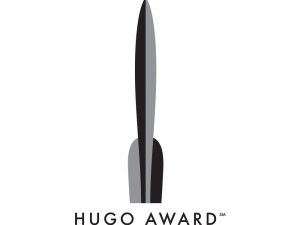 CoNZealand, the 78th World Science Fiction Convention, received 2,221 valid ballots, down from 3,097 at Dublin 2019: An Irish Worldcon, Worldcon 77. There were 1,584 valid nominating ballots, down from 1,800.
CoNZealand, the 78th World Science Fiction Convention, received 2,221 valid ballots, down from 3,097 at Dublin 2019: An Irish Worldcon, Worldcon 77. There were 1,584 valid nominating ballots, down from 1,800.
The procedure for counting nominations was the same as last three years, using the system known as E Pluribus Hugo, or EPH. The rather complicated point system gives a single point to each voter’s ballot, dividing that point among the nominees. The points are counted, the two nominees with the fewest points are compared, and (points notwithstanding) the one with the fewest nominations (votes) is dropped. The process repeats until down to six finalists; the last position on the ballot is determined strictly by votes unless there’s a tie. This system complicates discussing how close a runner-up to the ballot was, as some nominees might have eliminated others earlier on if they’d had just a few more points. For the sake of clarity we will summarize how close it was.
Once again, it’s time to explain the Australian ballot preference system used for the Hugo Awards. First-place votes (including those for No Award) are counted in column one. If no entry has the majority of the vote then the entry with the fewest votes is dropped (e). The dropped entry’s second-place votes now become first-place votes (column two) and the process is repeated until a nominee has a majority of the votes (usually six drops, with six finalists), deciding first place. Second place is determined by dropping the winner, counting their second-place votes as if they were first, etc. Therefore, the item that originally placed second doesn’t necessarily win second place. Likewise, third place is decided by dropping both first- and second-place winners, promoting the next eligible entry, and counting all over again. The system ensures that the winner is liked by a majority of voters, even though it may not have received a majority of first-place votes.
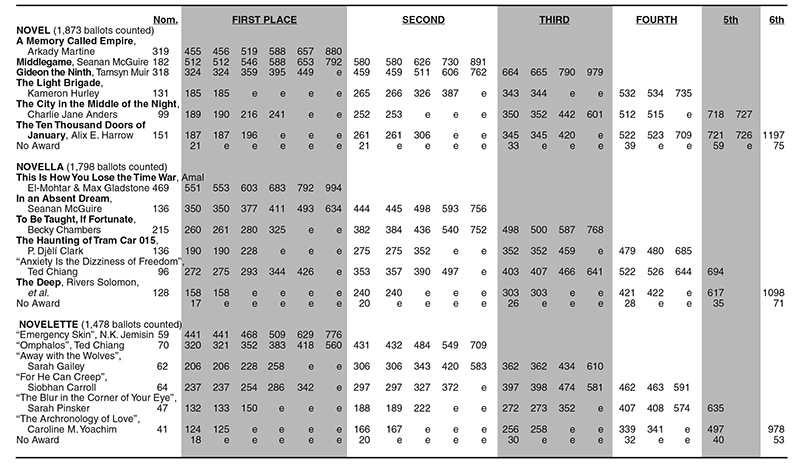
BEST NOVEL
A Memory Called Empire by Arkady Martine won, but had to duke it out with Middlegame by Seanan McGuire to get the victory. The Martine had the most nominations, but started the first round of voting in second place behind the McGuire, which held onto the lead until the fourth round, when the two tied, and the Martine managed to pull ahead in the fifth round, winning in the sixth. The McGuire led the next round of voting all the way to take second place. Gideon the Ninth by Tamsyn Muir took third in four rounds without serious challenge, followed in similar fashion by The Light Brigade by Kameron Hurley in fourth. The City in the Middle of the Night by Charlie Jane Anders came from behind to take fifth place with a one-vote lead over The Ten Thousand Doors of January by Alix E. Harrow, which ended up in sixth. Ann Leckie declined nomination for The Raven Tower, which came in third in the nomination voting. That left Tiamat’s Wrath by James S.A. Corey the closest runner-up, but dropping the Leckie makes it unclear how close the Corey was to making the ballot.
BEST NOVELLA
This Is How You Lose the Time War by Amal El-Mohtar & Max Gladstone won easily, coming in with the most nominations and the most first-place votes and holding the lead all the way through six rounds. The closest contender, Seanan McGuire’s In an Absent Dream, then went on to take second place in five rounds without a contest, and Becky Chambers’s To Be Taught, If Fortunate took third in four rounds. Ted Chiang’s “Anxiety Is the Dizziness of Freedom” led the first two rounds of voting for fourth place, but when The Deep by Rivers Solomon with Daveed Diggs, William Hutson & Jonathan Snipes was dropped, more votes went to The Haunting of Tram Car 015 by P. Djèlí Clark, giving it fourth in the third round. The Chiang then snagged fifth in a single round, and the Solomon, et al. took sixth. Silver in the Wood by Emily Tesh was the closest runner-up, needing 12 more votes to make the ballot. This was El-Mohtar’s second nomination and second win, and Gladstone’s second nomination and first win.
BEST NOVELETTE
“Emergency Skin” by N.K. Jemisin was in the middle of the pack as far as nominations went, but led from the start in first-place votes, taking first place in six rounds. “Omphalos” by Ted Chiang, which led in nominations, landed second place without significant challenge. Third was more of a contest, with “For He Can Creep” by Siobhan Carroll leading in the first three rounds, only to have “Away with the Wolves” by Sarah Gailey pull ahead in the fourth round to grab third place. The Carroll took fourth place without a fight in three rounds. “The Blur in the Corner of Your Eye” by Sarah Pinsker snagged fifth in just one round, leaving “The Archronology of Love” by Caroline M. Yoachim to take sixth. The closest runner up to the ballot was “Nice Things” by Ellen Klages, missing the ballot by only two votes. This was Jemisin’s seventh Hugo nomination, and her fourth win.
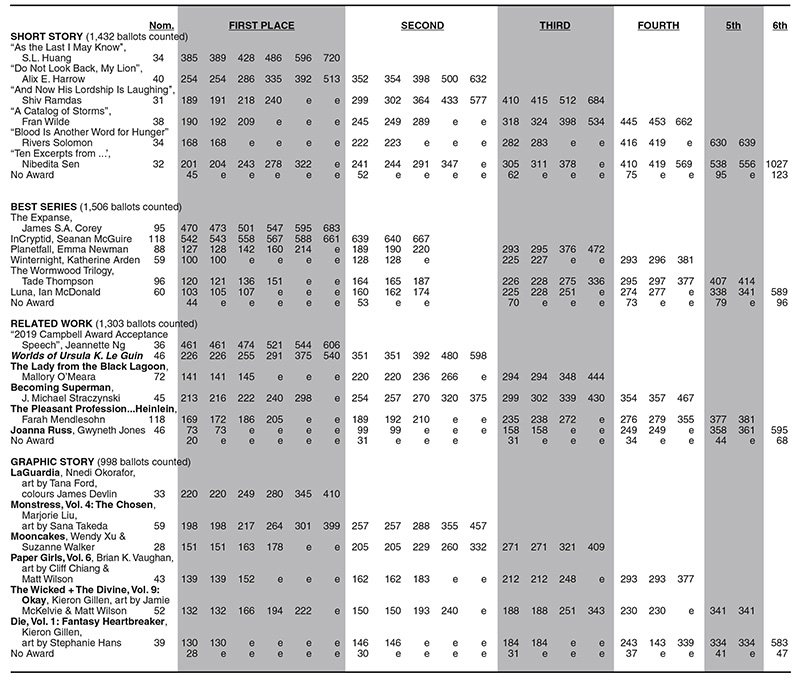
BEST SHORT STORY
S.L. Huang’s “As the Last I May Know” won, starting with the most first-place votes and holding onto its lead through six rounds of voting. The rest of the places went in similar fashion, with Alix E. Harrow’s “Do Not Look Back, My Lion” taking second, Shiv Ramdas’s “And Now His Lordship Is Laughing” third, Fran Wilde’s “A Catalog of Storms” fourth, River Solomon’s “Blood Is Another Word for Hunger” fifth, and Nibedita Sen’s “Ten Excerpts from an Annotated Bibliography on the Cannibal Women of Ratnabar Island” sixth. “Give the Family My Love” by A.T. Greenblatt was the closest runner-up, less than one point (or three nominations) away from making the ballot. This was Huang’s first nomination and win.
BEST SERIES
The Expanse series by James S.A. Corey won after a tough battle with the InCryptid series by Seanan McGuire. The InCryptid series had a big lead in nominations and a solid lead in the first round of voting, only to see that lead whittled away in the next three rounds. The Expanse pulled ahead in the fifth round and won in the sixth by 22 points. The InCryptid series stormed back and wiped out the competition for second place, winning in just three rounds. The Planetfall series by Emma Newman took third, leading throughout in four rounds. Fourth saw another tussle: The Wormwood Trilogy by Tade Thompson started with a slim two-point lead which dropped to one in the second round, and then the Winternight series by Katherine Arden pulled ahead four points in the third round, snagging fourth place. The Wormwood Trilogy got fifth place in two rounds, and the Luna series by Ian McDonald followed in sixth. The closest runner-up to the ballot was C.J. Cherryh’s Alliance-Union series, four nominations back of the ballot. This was Corey’s third Hugo nomination (the second in this category) and first win.
BEST RELATED WORK
Jeanette Ng’s “2019 Campbell Award Acceptance Speech” came in with the fewest nominations, but racked up the most first-place votes in the first round, and held the lead to win in six rounds. The documentary Worlds of Ursula K. Le Guin, directed and produced by Arwen Curry, took second place in the same fashion. Third place was more of a contest, with Becoming Superman by J. Michael Straczynski leading in the first two rounds, with The Lady from the Black Lagoon by Mallory O’Meara close behind; then Farah Mandlesohn’s The Pleasant Profession of Robert A. Heinlein dropped, giving third place to the O’Meara in the fourth round. The Straczynski snagged fourth place in three rounds without a fight. The Mendlesohn, which had the most nominations, took fifth in two, leaving Joanna Russ by Gwyneth Jones in sixth. Monster, She Wrote: The Women Who Pioneered Horror & Speculative Fiction by Lisa Kröger & Melanie R. Anderson was the first runner-up to the ballot, missing it by just under seven points. This was Ng’s first nomination and win.
BEST GRAPHIC STORY
LaGuardia by Nnedi Okorafor with art by Tana Ford and colors by James Devlin won, staying in the lead all the way through six rounds. All the places went in similar fashion: Monstress, Volume 4: The Chosen by Marjorie M. Liu with art by Sana Takeda snagged second in five rounds; Mooncakes by Wendy Xu & Suzanne Walker took third in four; Paper Girls, Volume 6 by Brian K. Vaughan with art by Cliff Chiang and colors by Matt Wilson came in fourth in three rounds; The Wicked + The Divine, Volume 9: Okay by Kieron Gillen with art by Jamie McKelvie & Matt Wilson won fifth in two rounds; and Die, Volume 1: Fantasy Heartbreaker by Kieron Gillen with art by Stephanie Hans ended up sixth. The closest runner-up was Invisible Kingdom, Volume 1 by G. Willow Wilson, illustrated by Christian Ward; it missed the ballot by under four points. This was Okorafor’s fifth nomination and second win; it was the first nomination and win for both Ford and Devlin.
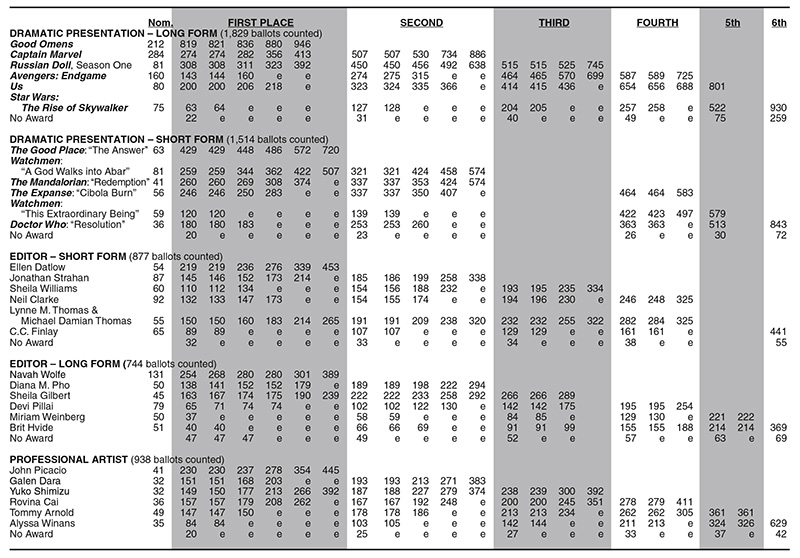
BEST DRAMATIC PRESENTATION – LONG FORM
Good Omens won easily, with a lead of more than 500 first-place votes in the first round, staying well in front to take the prize in just five rounds. Captain Marvel, which had the most nominations coming in, led all the way in voting for second place, taking it in five rounds. Third place was a bit of a contest: Russian Doll, Season One, led the first two rounds of voting for third place, but when Star Wars: The Rise of Skywalker dropped, enough of their votes went to put Avengers: Endgame into the lead by 45 votes – but then Us dropped and their votes boosted Russian Doll ahead again to win third place. Fourth place saw also saw some conflict, with Us leading the first two rounds, only to have Avengers: Endgame surge ahead in the third and final round. Us then snagged fifth place in a single round, and Star Wars: The Rise of Skywalker took sixth. The Watchmen TV series had enough nominations to make the ballot, but two separate episodes qualified for the Short Form ballot with more votes collectively, and the Administrators dropped Watchmen from this category. As a result, the runner-up to the ballot was Spider-man: Far From Home, but it’s difficult to say how far it was from the ballot.
BEST DRAMATIC PRESENTATION – SHORT FORM
The Good Place: “The Answer” won without a challenge, leading the voting all the way through six rounds. Second place was more of a contest, with The Mandalorian: “Redemption” and The Expanse: “Cibola Burn” tying for the lead in the first and second rounds of voting. Then when Watchmen: “This Extraordinary Being” dropped, its voters’ next-place votes went largely to the other Watchman episode on the ballot, “A God Walks Into a Bar”, which moved into the lead, only to tie for second place with The Mandalorian: “Redemption” in the fifth and final round. As a result, voting for third is skipped. The Expanse: “Cibola Burn” led from the start to snag fourth place. Watchmen: “This Extraordinary Being” placed fifth in just one round, and Doctor Who: “Resolution” landed in sixth. Once again, one nominee was dropped from the ballot: Good Omens: “Hard Times” was the top nominee in this category, but the entire series qualified in the Long Form category, where it had more votes, so the episode was dropped, and the Doctor Who moved up onto the ballot. The closest runner-up was The Good Place: “Pandemonium”, but its distance from the ballot is unclear.
BEST EDITOR – SHORT FORM
Ellen Datlow took the prize in six rounds, leading all the way. Lynn M. Thomas & Michael Damian Thomas led the first three rounds of voting for second place, but Jonathan Strahan, who had the most nominations, took over the lead in the fourth round, landing second in the fifth. Thomas & Thomas started out leading the voting for third, but Sheila Williams pulled ahead in the fourth round to snag third place. The Thomases led the first two rounds of voting for fourth, settling for a tie with Neil Clarke, leaving C.C. Finlay to take sixth. Navah Wolfe had enough nominations to make the ballot, but was determined to be ineligible, and dropped. Lee Harris was the closest runner up to the ballot, but again it’s unclear by how much. This was Datlow’s 21st nomination and ninth win.
BEST EDITOR – LONG FORM
Navah Wolfe came in with the most nominations and the most first-place votes, never losing the lead to win in six rounds. Second place was more of a contest, with Sheila Gilbert leading through four rounds, only to lose second place to Diana M. Pho by only two votes in the fifth round. Sheila Gilbert then snagged third in only three rounds. Devi Pillai led all the way in voting for fourth place, Miriam Weinberg took fifth in two rounds, and Brit Hvide ended up in sixth. This was Navah Wolfe’s fourth nomination and second win. The closest runner-up to the ballot was Gillian Redfearn, 11 votes away from the ballot.
BEST PROFESSIONAL ARTIST
John Picacio started with a solid lead in voting and held on to win in the sixth round. Galen Dara led the first three rounds of voting for second, briefly lost the lead to Yuko Shimizu in the fourth round, but reclaimed the lead to take second place in the fifth round. Shimizu then led all the way to snag third place in four rounds. In similar fashion, Rovina Cai took fourth place in three rounds, Tommy Arnold placed fifth in two, and Alyssa Winans followed in sixth. This was Picacio’s 16th nomination, his 14th in this category, and his third win. Will Staehle was the closest runner-up, needing just over one point to make the ballot.
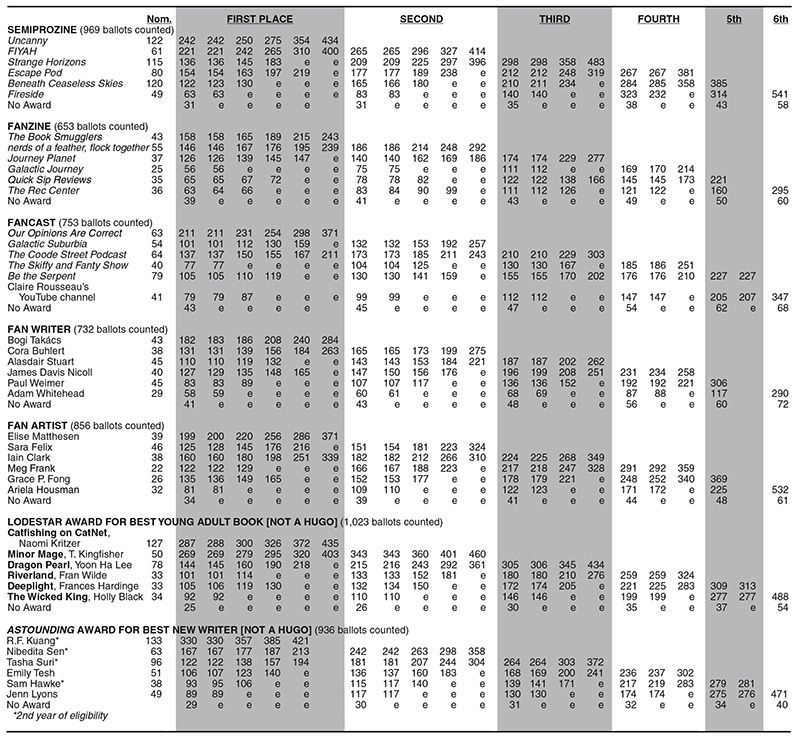
BEST SEMIPROZINE
Uncanny won, coming in with the most nominations and the most votes, leading the voting all the way through six rounds. FIYAH led all five rounds of voting for second, and Strange Horizons held the lead through four rounds to take third. Fourth place saw Beneath Ceaseless Skies leading for the first two rounds, only to have Escape Pod pull ahead to take fourth in the third round. Beneath Ceaseless Skies then snagged fifth place in a single round, and Fireside ended up in sixth. The closest runner-up was Interzone, a little over seven points back of the ballot.
BEST FANZINE
The Book Smugglers started with the most first-place votes and, except for a brief challenge from nerds of a feather, flock together in the third round, held onto the lead to win in the sixth round. Then nerds of a feather, which had the most nominations, snagged second place, leading all five rounds. Journey Planet led all the way through four rounds to take third, Galactic Journal came in fourth in three rounds, Quick Sip Reviews grabbed fifth place in a single round, and The Rec Center followed in sixth. The closest runner-up was Hugo Book Club Blog, needing six nominations to make the ballot.
BEST FANCAST
Our Opinions Are Correct won; it started with the most first-place votes and held the lead through all six rounds. The voting for second place started with The Coode Street Podcast in the lead for the first four rounds, but Galactic Suburbia jumped ahead in the fifth round to take second. The Coode Street Podcast then snagged third place, leading all the way through four rounds. The Skiffy and Fanty Show led all three rounds for fourth place, Be the Serpent (which had the most nominations) took fifth place, and Claire Rousseau’s YouTube Channel ended up in sixth. Verity! was the closest runner-up, seven votes or just under six points back of the ballot. This was the second nomination and win in this category for Our Opinions Are Correct.
BEST FAN WRITER
Bogi Takács won, leading in six rounds of voting. Similarly, Cora Buhlert then took second place in five rounds. Third place was a bit more of a contest, with James Davis Nicoll leading in the first three rounds, only to see Alasdair Stuart jump ahead in the fourth and final round. Nicoll then took fourth place in three rounds. Paul Weimer snagged fifth in only one round, and Adam Whitehead took sixth. Stuart and Weimer tied with the most nominations. The closest runner-up was Charles Payseur, six votes from making the ballot. This was Takács’s third nomination and first win.
BEST FAN ARTIST
Eise Matthesen took the Hugo, leading all the way through six rounds of voting. Second-place voting saw Iain Clark in the lead for the first four rounds, but Sara Felix, who had the most nominations but started the first round of voting back in fourth place, managed to inch up into the lead in the fifth and final round. Iain Clark then led all four rounds to take third place, Meg Frank took fourth in three rounds, Grace P. Fong snagged fifth in only one round, and Ariela Housman followed in sixth. Steve Stiles was the closest runner-up, needing a bit under seven points to make the ballot. This was Matthesen’s first nomination and win.
LODESTAR AWARD FOR BEST YOUNG ADULT BOOK (NOT A HUGO)
Catfishing on CatNet by Naomi Kritzer came in with the most nominations and the most first-place votes, and held onto the lead to win in six rounds. The other places went in similar fashion: Minor Mage by T. Kingfisher led all the way for five rounds to take second place, Dragon Pearl by Yoon Ha Lee took third place in four rounds, Riverland by Fran Wilde snagged fourth in three rounds, Deeplight by Frances Hardinge got fifth in two rounds, and The Wicked King by Holly Black took sixth. The closest runner-up was Philip Pullman’s The Book of Dust: The Secret Commonwealth, just four votes, or slightly over three points, from making the ballot.
ASTOUNDING AWARD FOR BEST NEW WRITER (NOT A HUGO)
R.F. Kuang had the most nominations and the most first-place votes, and never lost the lead, winning in just five rounds. The rest of the places went without any contest: Nibedita Sen took second place in five rounds, Tasha Suri snagged third in four rounds, Emily Tesh landed fourth in three rounds, Sam Hawke took fifth in two, and Jen Lyons followed in sixth. Tamsyn Muir received enough nominations to make the ballot, but was ineligible because of a professional publication before 2018. Martine was the closest runner up after Muir was dropped, This was Kuang’s second year of eligibility. This award, given by Dell Magazines, was renamed this year from the John W. Campbell Award.
–Carolyn Cushman
This report and more like it in the September 2020 issue of Locus.
 While you are here, please take a moment to support Locus with a one-time or recurring donation. We rely on reader donations to keep the magazine and site going, and would like to keep the site paywall free, but WE NEED YOUR FINANCIAL SUPPORT to continue quality coverage of the science fiction and fantasy field.
While you are here, please take a moment to support Locus with a one-time or recurring donation. We rely on reader donations to keep the magazine and site going, and would like to keep the site paywall free, but WE NEED YOUR FINANCIAL SUPPORT to continue quality coverage of the science fiction and fantasy field.
©Locus Magazine. Copyrighted material may not be republished without permission of LSFF.








